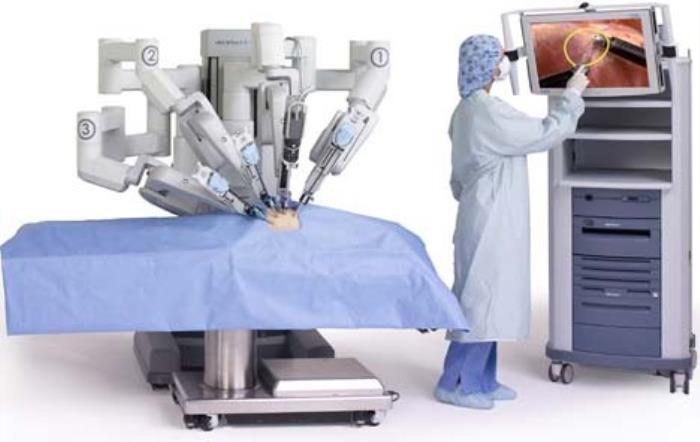Colon cancer, also known as colorectal cancer, originates in the colon or rectum. It is characterized by the abnormal growth of cells in these regions, which can form tumors. The risk factors for colon cancer include age, family history, and certain lifestyle choices such as a diet high in processed foods. Early detection through screening can significantly improve treatment outcomes.
Medical disclaimer: This content is for general awareness and does not replace a doctor’s consultation. For diagnosis or treatment decisions, consult a qualified specialist.
Traditional Surgery for Colon Cancer: A Comprehensive Insight
Traditional surgery, often referred to as open surgery, involves making a large incision in the abdomen to remove cancerous tissues. This method has been the standard for many years and allows surgeons to visually inspect the entire colon. While effective, it often requires longer recovery times and can lead to complications such as infections or bleeding.
Robotic Surgery for Colon Cancer: An Innovative Approach
Robotic surgery is an advanced surgical technique that utilizes robotic systems to assist in performing minimally invasive procedures. Surgeons control robotic arms equipped with surgical instruments, allowing for greater precision and control. This method has gained popularity due to its potential for reduced pain, shorter hospital stays, and faster recovery times compared to traditional surgery.

Key Differences Between Robotic and Traditional Surgery for Colon Cancer
The primary differences between robotic and traditional surgery for colon cancer lie in the technique and outcomes. Robotic surgery typically involves smaller incisions, while traditional surgery requires larger ones. This can influence post-operative recovery, with robotic surgery generally allowing for quicker return to normal activities. Additionally, robotic surgery may offer enhanced visualization and dexterity during the procedure.
Benefits of Robotic Surgery for Patients with Colon Cancer
Patients undergoing robotic surgery for colon cancer often experience several benefits, including reduced post-operative pain, shorter hospital stays, and lower rates of complications. The minimally invasive nature of the procedure can also lead to less scarring and quicker recovery times, enabling patients to resume normal activities sooner. Furthermore, robotic systems provide surgeons with enhanced precision and control, potentially improving surgical outcomes.
Potential Risks and Complications of Robotic Surgery
While robotic surgery offers numerous advantages, it is not without risks. Potential complications may include bleeding, infection, and damage to surrounding organs. Additionally, the technology relies on advanced equipment and skilled operators. If complications arise, they may require conversion to traditional surgery, which can negate some of the benefits of the robotic approach.
Recovery Process After Robotic Surgery for Colon Cancer
The recovery process after robotic surgery for colon cancer is typically faster than that of traditional surgery. Patients can often return to normal activities within a few weeks, depending on their overall health and the extent of the surgery. Pain management is usually more straightforward, and the smaller incisions lead to reduced discomfort. Regular follow-up appointments are essential to monitor recovery and detect any potential recurrence of cancer.
Factors Influencing the Choice Between Robotic and Traditional Surgery
Several factors influence the choice between robotic and traditional surgery for colon cancer. These include the stage of the cancer, the patient's overall health, and the surgeon's expertise with robotic systems. Additionally, the availability of robotic technology in the healthcare facility plays a crucial role. Patients should discuss their options thoroughly with their healthcare providers to make informed decisions.
The Role of Surgeon Expertise in Robotic Surgery Outcomes
The expertise of the surgeon significantly impacts the outcomes of robotic surgery for colon cancer. A skilled surgeon familiar with robotic techniques can optimize the advantages of the technology, leading to better surgical precision and patient outcomes. It is essential for patients to inquire about their surgeon's experience with robotic procedures and their success rates in performing colon cancer surgeries.

Cost Comparison: Robotic Surgery vs. Traditional Surgery
The cost of robotic surgery for colon cancer may be higher than that of traditional surgery due to the advanced technology and equipment involved. However, the potential for shorter hospital stays and quicker recovery may offset some of these costs. Patients should consider both the immediate and long-term financial implications when discussing surgical options with their healthcare providers.
Patient Satisfaction: Robotic Surgery vs. Traditional Surgery
Studies indicate that patient satisfaction rates tend to be higher for those who undergo robotic surgery compared to traditional methods. Factors contributing to this satisfaction include less pain, quicker recovery times, and improved aesthetic outcomes due to smaller incisions. However, individual experiences may vary, and it is important for patients to communicate their expectations and concerns with their healthcare team.
Long-Term Outcomes of Robotic Surgery for Colon Cancer
Long-term outcomes for patients who undergo robotic surgery for colon cancer are generally favorable. Research suggests that robotic techniques may offer similar or improved survival rates compared to traditional surgery. Ongoing studies continue to evaluate the long-term efficacy of robotic surgery, particularly regarding cancer recurrence and overall quality of life for patients.
Patient Education and Decision-Making for Surgical Options
Patient education plays a vital role in the decision-making process for surgical options. Healthcare providers should ensure patients understand the differences between robotic and traditional surgery, including the benefits and risks associated with each method. Providing clear, comprehensive information empowers patients to make informed choices aligned with their health goals and preferences.
Technological Advancements in Robotic Surgery for Colon Cancer
Advancements in robotic surgery technology continue to enhance surgical capabilities for colon cancer treatment. Innovations such as improved imaging systems, enhanced robotic instruments, and better ergonomic designs are contributing to more precise and effective surgeries. These advancements are likely to expand the applications of robotic surgery and improve patient outcomes in the future.
Multidisciplinary Approach in Treating Colon Cancer
A multidisciplinary approach is crucial in treating colon cancer, integrating the expertise of surgeons, oncologists, radiologists, and nutritionists. This collaborative effort ensures comprehensive care, addressing not only the surgical aspect but also the medical and supportive needs of the patient. Such an approach can improve overall treatment outcomes and enhance the patient's quality of life.
Future Trends in Robotic Surgery for Colon Cancer
The future of robotic surgery for colon cancer looks promising, with ongoing research and development aimed at enhancing surgical techniques and patient outcomes. Innovations may include the integration of artificial intelligence to assist in surgical planning and intraoperative decision-making. As technology continues to evolve, robotic surgery may become an increasingly preferred option for colon cancer treatment.
Advances in Targeted Therapy for Colon Cancer Patients
Discover the latest advances in targeted therapy for colon cancer patients. These innovative treatments focus on specific genetic and molecular markers of cancer cells, minimizing harm to healthy tissues. Learn how targeted therapies are transforming outcomes and offering new hope to patients with advanced colon cancer.
Role of Minimally Invasive Surgery in Colon Cancer Treatment
Explore the growing importance of minimally invasive surgery in colon cancer treatment. Techniques like laparoscopy and robotic-assisted surgery offer shorter hospital stays, quicker recovery, and less post-operative discomfort compared to open surgeries. This article sheds light on how these methods are enhancing patient care and treatment outcomes.
Comparative Studies on Robotic Surgery and Traditional Surgery
Comparative studies evaluating robotic surgery and traditional surgery for colon cancer have shown varying results. While some studies highlight the advantages of robotic techniques in recovery and complication rates, others emphasize the established efficacy of traditional methods. Ongoing research is essential to establish definitive conclusions and guidelines for optimal surgical practices in colon cancer treatment.
Best Colon Cancer Treatment in India
The Best Colon Cancer Treatment in India includes advanced procedures such as minimally invasive surgery, chemotherapy, and targeted therapies to achieve the best outcomes for patients.
Colon Cancer Treatment Cost in India
The colon cancer treatment cost in india is competitive, providing patients with affordable access to high-quality care and innovative treatment options.
Best Colon Cancer Specialists in India
The Best Colon Cancer Specialists in India bring years of expertise in diagnosing and treating colon cancer, ensuring personalized treatment plans and compassionate care for every patient.
FAQs: Common Questions About Robotic and Traditional Surgery for Colon Cancer
What are the main advantages of robotic surgery for colon cancer?
The main advantages of robotic surgery include minimally invasive techniques, reduced pain, shorter recovery times, and lower complication rates compared to traditional surgery.
Are there any specific risks associated with robotic surgery?
Yes, potential risks include bleeding, infection, and the possibility of needing to convert to traditional surgery if complications arise.
How do I choose between robotic and traditional surgery?
Choosing between robotic and traditional surgery should involve a thorough discussion with your healthcare provider, considering factors such as cancer stage, overall health, and surgeon expertise.
What is the recovery time for robotic surgery?
Recovery time for robotic surgery is typically shorter than that of traditional surgery, with many patients returning to normal activities within a few weeks.
Is robotic surgery more expensive than traditional surgery?
Robotic surgery may have higher upfront costs due to advanced technology, but shorter hospital stays and quicker recovery can lead to overall cost-effectiveness.
Discover the Best Oncologists and Cancer Hospitals in India
When it comes to cancer treatment, finding the right specialist and hospital can make a significant difference in the outcome. In this blog, we have compiled a list of the top oncologists and cancer hospitals across major cities in India, ensuring that you have access to the best care available.
Top Oncologists in Major Cities
For those seeking expert oncologists, we have identified the best specialists in key cities:
Leading Cancer Hospitals
In addition to finding the right specialist, choosing the right hospital is crucial for comprehensive cancer care. Here are the top hospitals in major cities:
Get more indepth information on Cancer treatments and their costs
Conclusion
Finding the right oncologist and hospital is the first step in your cancer treatment journey. Explore the links above to learn more about the top specialists and hospitals in your area.